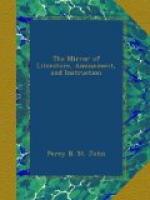“His highness’ baker shall not put alum in the bread, or mix rye, oaten, or bean flour with the same, and if detected, he shall be put into the stocks.
“His highness’ attendants are not to steal any locks or keys, tables, forms, cupboards, or other furniture of noblemen’s or gentlemen’s houses, where he goes to visit.
“Master cooks shall not employ such scullions as go about naked, or lie all night on the ground before the kitchen fire.
“No dogs to be kept in the court, but only a few spaniels for the ladies.
“Dinners to be at ten, and suppers at four.
“The officers of his privy chamber shall be loving together, no grudging or grumbling, or talking of the king’s pastime.
“The king’s barber is enjoined to be cleanly, not to frequent the company of misguided women, for fear of danger to the king’s royal person.
“There shall be no romping with the maids on the staircase, by which dishes and other things are often broken!
“The pages shall not interrupt the kitchen maids.
“The grooms shall not steal his highness’s straw for bed, sufficient being allowed to them.
“Coal only to be allowed to the king’s, queen’s, and lady Mary’s chambers.[2]
“The brewers not to put any brimstone in the ale.
“Twenty-four loaves a-day for his highness’ greyhounds.
“Ordered—that all noblemen and gentlemen at the end of the session of parliament, depart to their several counties, on pain of the royal displeasure.”
The following items contain nothing very remarkable, and if they did, perhaps I have copied enough already for a specimen of this ludicrous manuscript.
W. H. H.
[2] Hence it was found necessary
for the pages and servants
to run about to warm themselves
with different diversions
before going to bed.
* * * * *
FOUR THIEVES’ VINEGAR.
In an old tract printed in the year 1749, it is stated that one Richard Forthave, who lived in Bishopsgate-street Without, sold and invented “a vinegar,” which had a great run, and he soon became noted; and from this it may be concluded that the length of time has caused the above corruption. The article in the pamphlet is headed “Forthave’s Vinegar.”
W. H. H.
* * * * *
FISH.
Philip II. of Spain, the consort of our Queen Mary, gave a whimsical reason for not eating fish. “They are,” said he, “nothing but element congealed, or a jelly of water.”
It is related of Queen Aterbates, that she forbade her subjects ever to touch fish, “lest,” said she, with calculating forecast, “there should not be enough left to regale their sovereign.”
* * * * *




